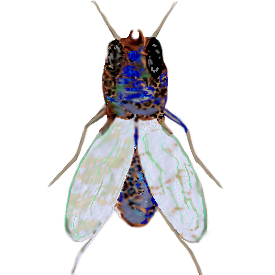Spotted necrofly
From Wikimalia
(Difference between revisions)
(re-posting) |
|||
| Line 2: | Line 2: | ||
|image=Spotted Necrofly.png | |image=Spotted Necrofly.png | ||
|name=Spotted Necrofly | |name=Spotted Necrofly | ||
| - | |habitat= | + | |habitat=Temperate regions, any. |
| - | |description= | + | |description=Similar in many respects to the common housefly, except perhaps being twice as large and more aggressive, the necrofly is omnipresent, especially near farms or anyplace where an animal might die and rot. Their large eyes cover almost the entire front of the head, just above an articulate proboscis. They appear fuzzy, as they are coated with millions of tiny fine hairs over the whole body. Their wings are shortish and rounded, transparent and veiny. When a female is fertilized and about to lay eggs, their bodies seem to change colors, typically a metallic blue or green. |
| - | + | |notes=These scavengers will eat nearly anything, so long as it is dead and rotting. Their larvae, necromaggots, have even been used medicinally in treating necrotic wounds, as they will devour the dead flesh, but leave the healthy tissue alone. Wounds treated in such a fashion tend to heal more quickly than traditionally treated wounds, lending credence to the speculation that even their excrement contains some substances that promote rapid healing. Some cultures use no other treatment for such wounds, especially wounds produced by animal venom, such as spider bites, scorpion stings, and snakebites. | |
| - | |notes= | + | |
}} | }} | ||
| + | Caution should be used in collecting necrofly specimens, as they bear a more-than-passing resemblance to many forms of biting flies and even some aggressive bees. | ||
{{stub}} | {{stub}} | ||
Back to the [[Insect/Arachnid]] page. | Back to the [[Insect/Arachnid]] page. | ||
Revision as of 16:11, 7 March 2009
| The Bug Collection | ||||||||
|---|---|---|---|---|---|---|---|---|
|
| ||||||||
| ||||||||
Caution should be used in collecting necrofly specimens, as they bear a more-than-passing resemblance to many forms of biting flies and even some aggressive bees.
This article is a stub. You can help Wikimalia by expanding it.
Back to the Insect/Arachnid page.

